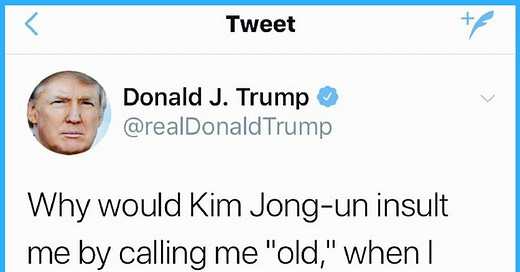Paralipsis: The Art of the Insult
If it's good enough for our politicians, why can't the nonprofit sector use this rhetorical technique for giving feedback?
I’ve noticed my posts creeping later and later into Mondays. Maybe that’s just how my brain is working these days. Each week, I sift through the flaming dumpster fire of news, analysis, and political mayhem, only to realize there’s too much to write about and not enough time. That said, I’ll do my best to be more consistent with publishing first thing Monday mornings friends!
Now, onto the real topic: paralipsis.
I recently learned this word while listening to a recent episode of Slate’s Amicus podcast. Asha Rangappa, a former FBI special agent, editor at Just Security, and author of The Freedom Academy on Substack, was discussing how some people are determined to use the law to break the law. Unsurprisingly, she was talking about Donald Trump and his administration.
It was a fascinating episode, and I highly recommend giving it a listen. Rangappa made an important distinction between what is “legal” and what is just. This is something the public needs to consider more deeply. Trump and his allies are exploiting every legal loophole to bend the government to their will. History teaches us that fascism rarely arrives by force—it seeps in through the slow subversion of political systems. Right now, we’re witnessing that subversion in real time. The question remains: are there enough safeguards in place to prevent a full-blown slide into fascism?
But what does this have to do with paralipsis?
The podcast host pointed out that Trump is infamous for using this rhetorical device. At first, I assumed it referred to some kind of speech impediment.
Instead, here’s what it actually means:
Device: Paralipsis
Origin: From the Greek paraleipsis, meaning “omission.”
Definition: Calling attention to something by specifically stating that you will not mention it.
Effect: The audience focuses on what is supposedly being omitted.
An example?
“I’m not going to say that I told you so.”
Trump employs this tactic frequently to insult his opponents and to take jabs at those who disagree with him.
Take this infamous tweet about North Korean dictator Kim Jong-un:
“Why would Kim Jong-un insult me by calling me 'old', when I would NEVER call him 'short and fat'?”
It’s not often that I learn something useful from Donald Trump, but paralipsis might actually be handy in the world of fundraising. We are a sector that is known for constantly bowing down to funders and donors in an attempt to find funds for our organizations and causes. We spend a lot of time placating people with privilege in order to get them to give. In my experience, it’s been a lot of paralipsis from donors to charities and not so much in the reverse.
Maybe we should be using it more often.
Imagine speaking to funders and saying:
“I don’t want to raise the fact that you’re chronically underfunding organizations, so I won’t.”
Or pointing out bureaucratic inefficiencies:
“I would never say that this grant application form is vague and mind-numbingly long, so I won’t.”
Or, if we wanted to get bold, the nonprofit sector could address U.S. policymakers with a nice paralipsis like:
“We would never imply that your funding cuts are needlessly killing vulnerable people around the world… So we won’t.”
Paralipsis offers a way to highlight uncomfortable truths while maintaining plausible deniability. The private sector keeps telling us to be more like them, and government’s want us to be more “business-like.” Trump is the ultimate businessman, so if our world leaders can use paralipsis to manipulate, why shouldn’t we use it to tell them how we feel about their inadequacies?
Just food for thought.
In solidarity,
Liz





Brilliant. Count me in.
Spot-on. I would never say that my country's president is a fascist dictator who only cares about himself...so I won't. ;-)